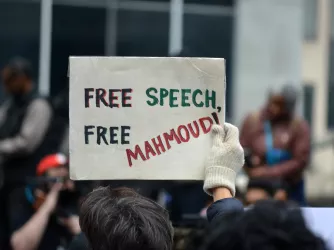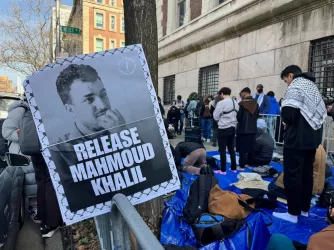Table of Contents
Penn’s ‘Speech Police That Never Were’ Illustrate Need for Increased Student Oversight, Fewer Admins

As an undergraduate at the University of Pennsylvania, I don’t often worry that free speech rights are in jeopardy on my campus. Penn has enjoyed FIRE’s highest, “green light” rating for many years, and it maintains university-wide Guidelines on Open Expression that guarantee protections for student and faculty speech. Frankly, things are pretty good when it comes to free speech at Penn.
So I was surprised by an episode last fall in which Penn seemed to be on the precipice of exacting serious punishment for “insensitive” speech. The incident, and the way it unfolded, provides valuable lessons for protecting free expression on even the most speech-friendly campuses.
It all started when I opened a copy of the campus newspaper last fall to find an op-ed by two students announcing the impending launch of a new “Greek Community Judicial Board.” Administrators had reportedly granted disciplinary authority to the student-led board and charged them with specifically targeting certain kinds of speech within the campus’ Greek community. The board was to be on the lookout for “potential cultural insensitivity” and could “levy sanctions against members or chapters of the Greek community with the approval of the Office of Fraternity and Sorority Life and the Office of Student Conduct.”
While promoting cultural harmony in a diverse space like a university may be a laudable goal, questions about what types of behaviors constitute actionable “insensitivity” are far from settled, both on campus and nationwide; furthermore, the university is the ideal setting to have these debates. The ability to do so, however, is predicated on the ability to frankly and honestly express a wide range of opinions—even “insensitive” ones—without fear of punishment. An official board set up to police insensitivity assumes that institutionalized norms of what constitutes “insensitivity” already exist. They don’t.
Recognizing the potential danger this board posed to open expression, I contacted a few students and faculty members whom I knew to also care deeply about free speech values. They’d also seen the op-ed and were already asking questions of senior administrators.
A few days later, the campus paper ran another article about the proposed board. This time, senior administrators seemed eager to back away from the proposal.
The director of the Office of Fraternity and Sorority Life admitted that “[t]here have been conversations with administrators,” but “not to the depth I think that the article suggests.”
The director of the Office of Student Conduct, Penn’s disciplinary investigation and sanctions body, said she “did not approve of” the board’s powers as outlined in the first article. And the faculty members who had raised concerns were also told that the Vice Provost for University Life had not approved of the board.
And so, fortunately, the board never came to be. But there are two important lessons for campus free speech advocates to take away from the story of The Speech Police That Never Were:
First, students and faculty must be vigilant—no matter how strong a school’s free speech commitments might be. This is particularly true for the campus press, whose watchful reporting alerted the wider community to the proposal. Freedom of speech does not arise by accident, nor does it long endure if not guarded and protected. I saw firsthand that even at a green light school, our rights are not and will never be so secure that we may take them for granted.
Second, “administrative creep” poses a real danger to student rights and cannot be ignored. As academia’s administrative bureaucracies have grown steadily for the past several decades, it has become harder to hold them accountable for institutional commitments to things like free speech. At Penn, for example, the number of full-time administrators increased 130 percent between 1987 and 2011. The Vice Provost for University Life alone oversees some 35 different offices, agencies, and programs, some with as many as a dozen staff members, and many with regulatory authority over student conduct.
In the case of the Greek judicial board, it’s hard to know exactly which administrators authorized or even knew about the proposed board to punish “cultural insensitivity.” And that’s precisely the point. Even when senior administrators are committed to upholding the principles of free speech, as I believe they are at Penn, as the ranks of their subordinates grow, it becomes more and more difficult to keep track of their actions.
Moreover, the scope of regulation grows as bureaucracy expands and as individual administrators seek to affirm their own necessity with new rules and programs. This means student life on campus is increasingly subject to policy and compliance and, in turn, the realm of individual discretion and judgment shrinks. In the American university system, where learning to think critically is at least theoretically an immersive experience not confined to classrooms and tests, it is worth at least questioning whether replacing discretion and debate with obedience and oversight has pedagogical costs as well.
The two lessons aren’t discrete, however. If administrative growth continues, the opportunities for rights to be violated unnoticed will increase, and heightened vigilance will become all the more crucial. Put simply, a “green light” today does not preclude the possibility of a “red light” tomorrow. While FIRE has had tremendous recent success in increasing the number of “green light” schools nationwide, such progress is not guaranteed to be permanent. If we hope for these vital steps forward to endure, it is incumbent upon all of us who would see the college campus be a home to productive discourse and disagreement to remain watchful and aware, even as we celebrate the victories we have achieved.
Alec Ward is a FIRE summer intern
Recent Articles
FIRE’s award-winning Newsdesk covers the free speech news you need to stay informed.

FIRE and coalition partners file brief rebuking the U.S. government for attempting to deport Mahmoud Khalil for his protected speech

FIRE and civil liberties groups challenge 'unconstitutional retaliation' against Mahmoud Khalil

Trump’s attack on law firms threatens the foundations of our justice system
